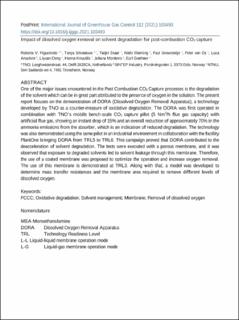Impact of dissolved oxygen removal on solvent degradation for post-combustion CO2 capture
V. Figueiredo, Roberta; Srivastava, Tanya; Skaar, Tarjei; Warning, Niels; Gravesteijn, Paul; van Os, Peter; Ansaloni, Luca; Deng, Liyuan; Knuutila, Hanna; Monteiro, Juliana; Goetheer, Earl
Peer reviewed, Journal article
Accepted version
Permanent lenke
https://hdl.handle.net/11250/3119244Utgivelsesdato
2021Metadata
Vis full innførselSamlinger
Originalversjon
10.1016/j.ijggc.2021.103493Sammendrag
One of the major issues encountered in the Post Combustion CO2 Capture processes is the degradation of the solvent which can be in great part attributed to the presence of oxygen in the solution. The present report focuses on the demonstration of DORA (Dissolved Oxygen Removal Apparatus), a technology developed by TNO as a counter-measure of oxidative degradation. The DORA was first operated in combination with TNO's mobile bench-scale CO2 capture pilot (5 Nm3/h flue gas capacity) with artificial flue gas, showing an instant drop of 15% and an overall reduction of approximately 70% in the ammonia emissions from the absorber, which is an indication of reduced degradation. The technology was also demonstrated using the same pilot in an industrial environment in collaboration with the facility PlantOne bringing DORA from TRL5 to TRL6. This campaign proved that DORA contributed to the deacceleration of solvent degradation. The tests were executed with a porous membrane, and it was observed that exposure to degraded solvents led to solvent leakage through this membrane. Therefore, the use of a coated membrane was proposed to optimize the operation and increase oxygen removal. The use of this membrane is demonstrated at TRL3. Along with that, a model was developed to determine mass transfer resistances and the membrane area required to remove different levels of dissolved oxygen.
